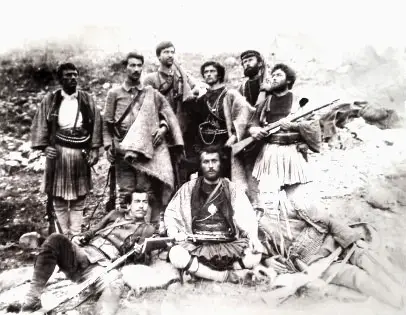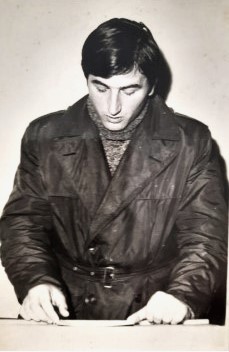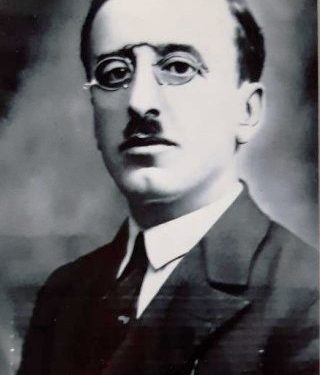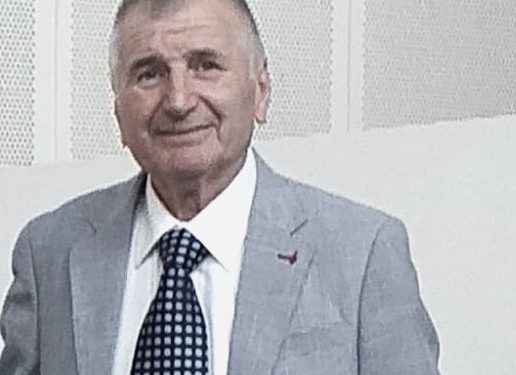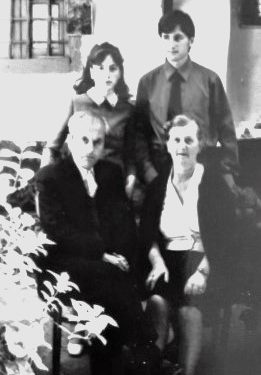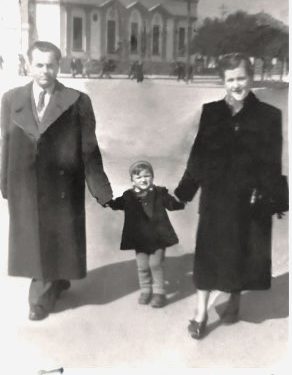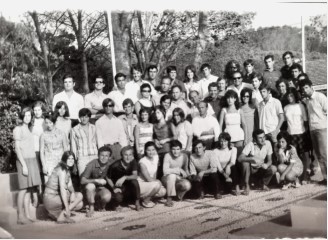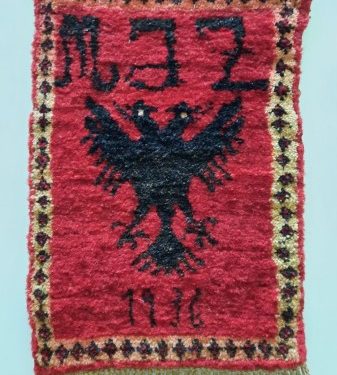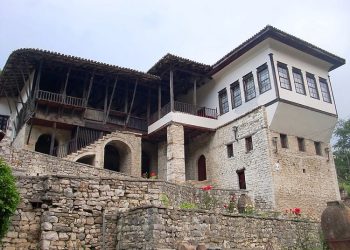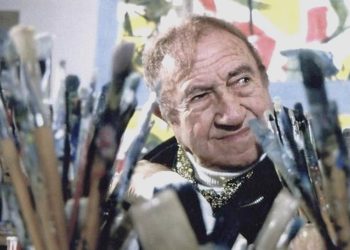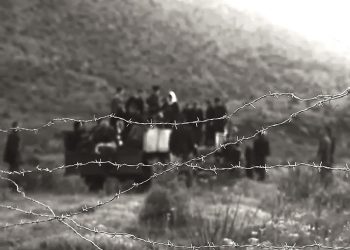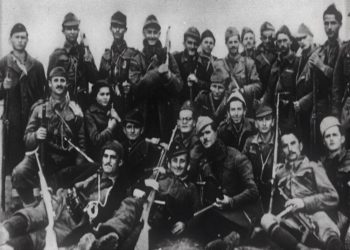By Nestor Topencharov
The first part
– “This book, in a modest way, I believe will contribute to know even more the inhumane methods of the State Security, the way they created the accusations” –
THE DRAMA OF LIFE
(THE STORY OF A FAMILY)
I dedicate this book to: All fellow sufferers. Their families. And in particular, to people who did not have the opportunity to tell the odyssey of life, during the communist dictatorship.
FORE SAYING
Memorie.al / I were born in the city of Korça, on October 22, 1953. I left Albania in October 1990, after we were given the right to repatriate to Yugoslavia (now North Macedonia) . In June 1992, I immigrated to Italy, where I still live today. Although I have been away for 32 years, I did not cut ties, as Albania was the country of my birth, where I spent 37 years, and that part of my blood is Albanian. Years later, the ties with Albania were strengthened, as I also took my wife from Durrës. We came every year on vacation, but the short time of our stay meant that many contacts were cut off. However, true friends and comrades remained forever in my heart.
In the last three years, I did not have the opportunity to visit Albania. But during 2022, I came several times. My commitment on the one hand and the coincidence on the other, made it possible for me to re-establish connections with friends and colleagues whom I had not seen for decades. Knowing my past, some of them advised me to write down what had happened in my life. At first, this idea seemed like a utopia to me, since even though I had been a good student; I had no inclination towards drafting. Then I reflected. I would just write my story, true events, where not much inspiration was needed. Perhaps a writer would know how to present these events, as a true pen artist knows. While I will write them, without many descriptions: briefly, simply, naked, as they happened.
Something else that pushed me even more to write this book was an interview on TV Klan, which I saw in October of this year, directed by the well-known journalist Blendi Fevziu. I didn’t seek revenge. But I didn’t even have justice. With the help of this book, I will make known to the Albanian public opinion, the role of the individuals who contributed to my suffering and that of my family. And today, I am putting my finger on these “beings”, not for the task they had, but for the way they performed it. I will start my writing with my grandfather, from my mother’s side, to continue with my father, where I will touch on the most important moments of their lives. This will help the reader to know my background.
Then I will also talk about myself. In this book I will also tell some events, one more dramatic than the other, that happened to people I had the honor of knowing. I am glad that many books have been published on the suffering and persecution of “enemies of the people” and their families in internment camps and prisons during the communist dictatorship. I was able to read some of these works. I believe that this book, in a modest way, will contribute to know even more the inhumane methods of the State Security, the way they created accusations and how they destroyed people and families to keep the people under terror.
Author
December, 2022
FIRST CHAPTER
For more than four centuries, the Balkans were under the rule of the Ottoman Empire. Various countries such as Greece, Romania, Bulgaria, Serbia and Montenegro during the Century. of XIX, had gained autonomy. To reach then in 1878, first with the Treaty of Saint Stephen, and after a few months with the Berlin Congress, the recognition by the Great Powers of the independence of these states. The only Balkan nations that had not yet gained independence from the Ottoman Empire were Albania and Macedonia. This was the reason why the patriots of these two peoples cooperated for the independence of their states.
One of the important figures of the Macedonian Committee was my grandfather (mother’s father) Ivan (Jovan) Zllataref, who was born in the city of Ohrid, in 1884. Around the 1910s, he had collaborated with both Themistokl Germenji and with the squad of Çerçiz Topulli and Mihal Gramenos. In October 1912, the Balkan war began. This war brought new changes to the borders of the Turkish Empire. Albania, on November 28 of that year, declared independence and created its own state, while Macedonia was divided into three parts, between Serbia, Bulgaria and Greece.
In this period, the grandfather was married to the daughter of an old Korça family (Shqau). To continue his political activity, he settled in the city of Korça, where he continued to connect the Macedonian movement with the Albanian patriots. For his patriotic activity, he was sentenced to death by both the Serbs and the Greeks. Sent by the Macedonian Committee, the grandfather and his family had lived for several years in Trieste, as a representative of this committee. In 1928, after finishing this task, he returned to Korça. From there he was exiled by the Royal government, at the request of the Serbs, first in Bari and then with his family, in the city of Vlora.
Even in Bari, the grandfather continued to have contact with well-known figures from the Korça area, such as Nuçi Palla, Gavril Pepo, etc. I remember that when I was in the first years of high school, the agronomist Maqo Pepo, Gavril’s son, (whose name was the street of the house where I lived) invited me to his house one day. He showed me his father’s correspondence with my grandfather during the exile, where the main topic was patriotism.
The collaboration with Themistokl Germenji was not only in the political field, but a family friendship was also created. After the murder of Themistocles, the friendly relationship with his wife, Eudhoksia, continued until his death. The city celebrated the 10th of December, the day of the proclamation of the Autonomous Republic of Korça, with grandeur. My sister and I, for several anniversaries, wore the family crown, while my mother wore the dignitaries and other people who visited Themistocles’ house after the ceremony.
In Korça, the grandfather had opened a shop, where he worked as a goldsmith, a family trade, from which the surname Zllataref (in Macedonian “zllato”, means gold) was derived, and after the 30s, he withdrew from politics. At that time, the situation in the Balkans had changed a lot and new political balances had been created.
During the Second World War, when Italy had occupied Albania, the grandfather was arrested on the charge of being a participant in the Anti-Fascist Movement. At that time there were spies working for the Italians who played a double game. To create confidence in the invaders, they gave some name and, since my grandfather was involved in politics in the past, he was the right person to denounce. After they kept him for a few weeks and after doing the proper verifications, the grandfather was released for lack of evidence.
When the partisans entered the city on October 24, 1944, the grandfather was arrested again and accused of being a fascist. In that period, many dignitaries of the city and people who had anti-communist ideas were arrested. All of them were put in a prison, which was called “Hani with two gates”. That period was very difficult. You could also be executed without a trial.
In the following months, they came for inspections from Tirana. In one case, an important cadre of the Party appeared who knew the grandfather, as they had been in the cell together during the time of Italy. Knowing who my grandfather was, I was surprised to see him there. When he had asked why he had been arrested, the grandfather answered: “Because they call me Zllataref”!
In this period, the verification of the charges against the arrested persons was very slow. Finally, again this time due to lack of facts, after several months, they release him. Towards the end of 1947, my mother and grandmother went to Bulgaria to meet my uncle, who had finished his studies in medicine and had started working at the hospital in Sofia.
Uncle Robert graduated from Korça High School and, after graduation, went to study medicine in Italy. When Rome was bombed by the Allies in 1943, the uncle went to Bulgaria to finish his studies, as his aunt lived there. After a few weeks of stay in Sofia, the mother and grandmother would return to Korça, where before they stayed for a few days in Bitola, in the house of a nearby tribe of the grandfather.
In those days, my father had also gone to this city on business. We are in the first years after the war. The signs were everywhere visible. Quadro had a few. Those who were based in Skopje and were sent there by service where the need arose. Father had studied topography in Belgrade, before the war. Now that there was a need for reconstruction and infrastructure, his profession was in high demand. My father told me that, when he reached Manastir, it had snowed heavily. In the few hotels in the city, there were no seats. Then he went into a bar to drink something warm and decide where he would spend the night. There were some cousins in town. At that moment, he felt someone touch him on the shoulder. When he returned, he saw one of them, who, after hugging him, invited him to his house, exactly where his mother was.
That dinner, my parents were given a chance to get to know each other. After the first sympathy, which transformed into a stronger feeling, they gave each other the word, that after talking with the respective families, they would decide on the future. After a week of getting to know each other, the mother and grandmother return to Korça. The grandfather gave his consent, as he knew the father’s family, which was also from Ohrid. In addition, both sons were out and this would be a good opportunity for my mother as well, since my grandfather, as a person who knew about politics, understood that the arrival of communism in Albania would make life difficult.
In 1948, a few months after my parents met, Yugoslavia was expelled from the socialist camp and the borders were closed. The only possibility of communication was the exchange of letters. This is how the year 1949 passed. In the following year, the mother began to face the pressure of the grandmother to end this relationship, since according to her, there was no solution. The political situation with Yugoslavia was very difficult and my mother was getting close to marrying age.
At that time, several Korça families were looking for a mother for their sons. Last, but not least, was that the grandmother did not want to take the girl away from Korça. After much pressure, finally the mother writes the last letter to the father. This was the fate of their relationship and she, “was not a bird to fly”. Maybe the best thing was that each one followed his own destiny.
When the father received this letter, he was very worried. His love for his mother was very great, although the time they had known each other was very short. The next relationship, for almost three years, had continued by letters. After thinking it over, he finally found the solution. He would cross the border illegally to enter Albania. This calmed him down. At first he thought of going overland, but then he changed his plan. It would be better from the lake side, since the land border in that period was heavily guarded by the Yugoslav side. This did not mean that crossing the lake was easier, physically. But it was not a problem for him, since he was born in Ohrid, with a house on the shore of the lake, and since he was little, he had learned to drive. For him, the boat was a toy.
He thought it best to have a friend with him, as that way the rowing would be easier and the crossing would be quicker. The father had many friends, but for this enterprise he had to find someone, so that he too would be interested in moving to Albania. He finally found the right man. He, like his father, lived in Skopje at that time. He was married and had two children.
His family was in Sofia. When Yugoslavia was expelled from the socialist camp, he too could not go to Bulgaria. So that, when he arrived in Albania, it would be easier for him to join his family. After agreeing on the night they would leave, the father asked his friend to be careful and not to be noticed.
The day before he crossed the border, he went to Ohrid, where he stayed with close people, his brother and sisters. His parents were dead. The father was years old, while the mother was a little while ago. The sisters lived with their families, very close to their parents’ house. At dinner they were all gathered and he looked in silence one after the other, the beloved faces, with the thought that he might not see them again.
The father was a man of conversation and kept the table alive, a man of jokes. That dinner, not a word came out of his mouth. The relatives noticed this silence and asked him what had happened to him, but he reassured them: he was only a little tired. After dinner, he hugged everyone and from 10:30 p.m., he left the house and headed to the place where he had left the meeting with his friend.
It was the month of June 1950. On the shore of the lake there was a complete calmness. The guards patrolling the lake that evening had a dinner at a bar near the shore, where they were celebrating something. The old city rose on the rock. Many houses of one of the neighborhoods of the city were on the shore of the lake. Some families of this area had their own boats, as they were engaged in fishing. There they took a boat and began to grow slowly, so as not to make noise, until they left the shore. The shortest route to enter Albania was from the village of Lin, since Pogradec was far away. Usually this distance, my father told me, was done in a few hours. After they had been paddling for almost an hour, waves started to rise in the lake. Driving started to become difficult. The boat went one meter forward and two meters back. It was a rare occasion that in the month of June, the lake had such big waves.
The friend was scared and suggested that they go back. The father cut short that it would be a suicide, as the Yugoslav guards could catch them. They continued driving, which had become very difficult. There was a risk of drowning, as a lot of water entered the boat. The father gave the oars and his friend emptied the water with a container, which luckily was in that boat. After hours and hours of rowing, he noticed that the oars could snap. Then they used all the tools they had to tie them, from handkerchiefs, ties to socks. Fortunately, when they started to approach the Albanian coast, the waves lost their strength. They arrived in Lin early in the morning. The wavy lake had made them spend twice as much time, but what was more important; they had arrived safely in Albania.
When they came ashore, they encountered some children, but they were unable to communicate with them, since both the father and his friend, Kiril, did not know Albanian. After a while, the policeman (the all-powerful of the area) comes, who invited them to his office and offered them a warm tea. After all those hours in the lake and with the moisture in their bodies, this drink made them feel good.
They couldn’t even talk to the policeman, since he didn’t know Yugoslav either, until a translator from the village came, with whom, after exchanging a few words, they explained who they were. Then they informed him that they would wait a little longer, after they had informed the Internal Branch of Pogradec. After the arrival of the Security officer, the reason for the escape was explained to him. He was then told about the political situation between the two countries, which was very difficult.
During this period, many Yugoslav communists who did not accept Tito’s policy, moved to Albania. As for their case, due to family problems, this had been a very dangerous undertaking. The father did not forget to ask him to return the boat to the owner, which the officer promised. Then they took them to the town of Pogradec. There, after the proper verifications were made, the father and his friend were transferred to the village of Llakatund in Vlora, where they kept all the political emigrants who escaped from Yugoslavia.
When they told mom that her fiancé had arrived, she couldn’t believe that dad had taken such a big risk. But, on the other hand, he realized that his love was so great that there was no obstacle that could stop him. Then the mother, accompanied by the grandfather, went to Vlora to meet him. But several years had to pass until the father received Albanian citizenship, which gave him the right to marry.
In January 1953, after the marriage, the parents moved to Tirana, where the father started working first in the Ministry of Agriculture and then in the Ministry of Construction. At that time, even in Albania, there were few cadres and it was up to my father, as a topographer, to make his contribution, from Vermoshi, in the north of Albania, to the Pavllo River, in the reclamation of the Mursia field, in the south of the country.
Although he often went on business outside of Tirana, he still had plenty of time to spend with his mother. They were beautiful years for them, as their happiness was also increased by my coming into life. At first they lived in a hotel and then in the house of a family from Dibra, the family of Ali Kërluku, with whom we have always had very good relations, even after returning to Korçë.
When the father came to Albania, he wanted to return to his country with his wife after getting married, but the political situation between the two countries did not give him this opportunity. We are in 1955, when Khrushchev goes to Belgrade. In that period, relations between Albania and Yugoslavia also improved. This caused the father, seeing the favorable political situation, to apply for repatriation. At this moment, the documents were accepted, but unfortunately, after a few months, they informed him that his request was rejected.
This was a consequence of the Hungarian events of 1956, which brought back the difficult situation between the two neighboring countries and caused the border to be closed again, which this time would last until 1990. In response, it was suggested that this request could to be repeated after a few years. Memorie.al
The next issue follows




